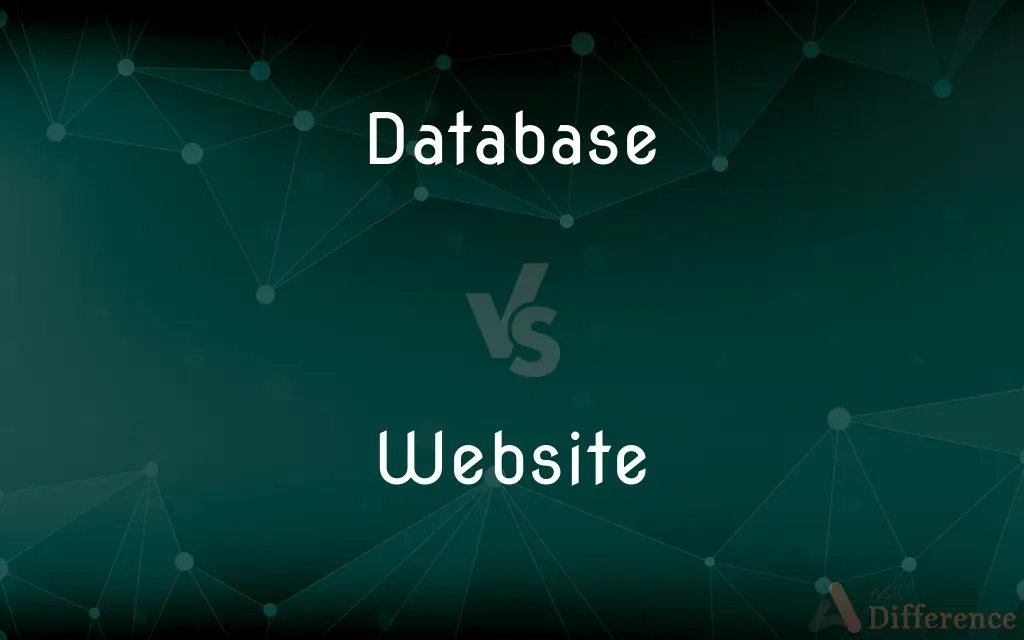Database vs. Website — What's the Difference?
Edited by Tayyaba Rehman — By Fiza Rafique — Published on November 11, 2023
A database stores and organizes data; a website is a set of interconnected web pages accessed via the internet.

Difference Between Database and Website
Table of Contents
ADVERTISEMENT
Key Differences
A database is a structured set of data held in a computer or server, accessible in various ways. It's designed to hold vast amounts of information in an organized and manageable manner. On the other hand, a website is a collection of related web pages, typically including multimedia content, identified with a common domain name.
The purpose of a database is to store, retrieve, and manage data efficiently. Databases can handle vast amounts of information, from a company's financial records to user data for an application. In contrast, a website's primary goal is to present information or provide functionality to end-users through the internet, often using data retrieved from databases.
Databases often use a type of software called a database management system (DBMS) to facilitate these operations. This software allows for data input, updates, queries, and data retrieval. Websites, however, utilize web browsers for access and are constructed using languages like HTML, CSS, and JavaScript.
Security is a concern for both databases and websites. Databases require protection to ensure the data they contain remains confidential and intact. Websites need security measures to prevent unauthorized access, data breaches, and to ensure user safety while navigating.
To sum it up, while a database focuses on data storage and management, a website emphasizes presentation and user experience, often relying on databases to enhance its functionalities.
ADVERTISEMENT
Comparison Chart
Primary Function
Store and manage data
Present information or functionality to users via the internet
Tools & Software
Database Management System (DBMS)
Web browsers, HTML, CSS, JavaScript
Structure
Tables, rows, columns
Web pages, multimedia content, hyperlinks
Accessibility
Through DBMS software, direct queries
Via web browsers using URLs
Security Concerns
Data confidentiality, integrity, backups
Unauthorized access, data breaches, user safety
Compare with Definitions
Database
An organized collection of data for easy access and analysis.
The library's database contains information on all its books.
Website
A collection of related web pages with a specific domain name.
I visit that website daily for news updates.
Database
A structured collection of data.
The company's customer records are stored in a central database.
Website
A set of interconnected pages hosted on a web server.
She showcased her portfolio on her personal website.
Database
An electronic system for storing and retrieving data.
To find the product's details, we queried the database.
Website
A digital platform accessible via the internet.
The restaurant launched its new website with an online reservation system.
Database
A system that supports data storage, retrieval, and query operations.
The app pulls real-time information from its backend database.
Website
An online resource or service browsed using a web browser.
The educational website offers free courses for all age groups.
Database
A digital repository managed by a DBMS.
Maria used a relational database to organize her research data.
Website
A virtual presence representing a person, organization, or idea.
Every major corporation has an official website.
Database
A collection of data arranged for ease and speed of search and retrieval. Also called data bank.
Website
A set of interconnected webpages, usually including a homepage, generally located on the same server, and prepared and maintained as a collection of information by a person, group, or organization.
Database
To put (data) into a database.
Website
(Internet) A collection of interlinked web pages on the World Wide Web that are typically accessible from the same base URL and reside on the same server.
You can find complete information about the products on the company's website.
Database
(general) A collection of (usually) organized information in a regular structure, usually but not necessarily in a machine-readable format accessible by a computer.
I have a database of all my contacts in my personal organizer.
Database
(computing) A set of tables and other objects (queries, reports, forms) in the form of a structured data set.
The "books" database will have three tables, and the "customers" database will have two tables.
Database
A software program (application) for storing, retrieving and manipulating such a structured data set.
Which database do you use: MySQL or Oracle?
Database
A combination of such data sets and the programs for using them.
Database
To enter data into a database.
Database
An organized body of related information.
Database
An organized body of related information
Common Curiosities
Why might a company need a database?
Companies use databases to organize, store, and manage vast amounts of data efficiently.
Can a website use multiple databases?
Yes, a website can pull data from multiple databases to enhance its functionality.
How does a website function?
A website presents information or services to users via interconnected web pages accessed through the internet.
Is every website backed by a database?
Not necessarily. While many dynamic websites rely on databases, static websites might not.
What is a database?
A database is a structured set of data stored in a computer or server.
How is a website's design determined?
Website design is crafted using languages like HTML, CSS, and JavaScript.
Are databases only used by websites?
No, databases are used in various applications, from mobile apps to complex software systems.
Can I access a database directly from my web browser?
Typically, no. Direct database access is restricted, but you interact with it indirectly through websites or applications.
How do websites ensure user safety?
Websites implement security measures, like SSL certificates, to prevent data breaches and unauthorized access.
What's the role of a DBMS?
A DBMS manages and facilitates operations on a database, like data input, updates, and queries.
How do users typically interact with a database via a website?
Users can input, retrieve, or modify data on a website, which then interacts with the database on their behalf.
What makes a website dynamic?
A dynamic website can change its content or appearance based on user interactions, often retrieving data from a database.
Do all websites need constant internet connectivity?
While most websites require internet connectivity, some can be accessed offline once they've been loaded, especially if they use Service Workers or other caching techniques.
Can one database serve multiple websites?
Yes, a single database can be connected to and serve multiple websites.
What are the security concerns for databases?
Concerns include ensuring data confidentiality, integrity, and regular backups.
Share Your Discovery

Previous Comparison
Air Purifier vs. Dehumidifier
Next Comparison
Electron Affinity vs. Ionization EnergyAuthor Spotlight
Written by
Fiza RafiqueFiza Rafique is a skilled content writer at AskDifference.com, where she meticulously refines and enhances written pieces. Drawing from her vast editorial expertise, Fiza ensures clarity, accuracy, and precision in every article. Passionate about language, she continually seeks to elevate the quality of content for readers worldwide.
Edited by
Tayyaba RehmanTayyaba Rehman is a distinguished writer, currently serving as a primary contributor to askdifference.com. As a researcher in semantics and etymology, Tayyaba's passion for the complexity of languages and their distinctions has found a perfect home on the platform. Tayyaba delves into the intricacies of language, distinguishing between commonly confused words and phrases, thereby providing clarity for readers worldwide.












































